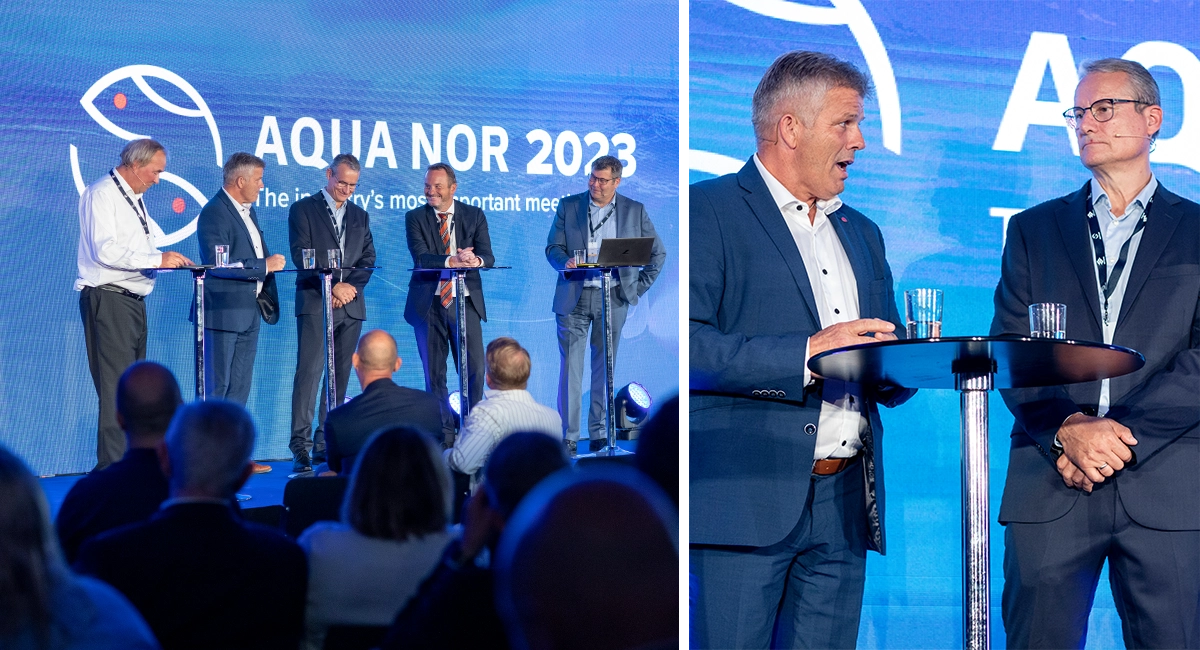
An interesting debate about salmon tax at Aqua Nor 2023
22. August 2023 · Ukategorisert
The infamous «salmon tax» caused a lot of stir in the aquaculture industry in Norway earlier this year. On the opening day of Aqua Nor, several key actors met to debate the consequences of the tax in front of a full conference hall.
— The resource rent tax does not treat the industry as it should; a long and complex value chain that is dependent on each other. The reactions (from the industry) are due to both to the fact that nobody expected this, as well as the tax model that has been chosen, says panel memberRagnar Nystøyl from Konatali Analyse.
For an hour, debate leader Thorvald Tande (editor, Norsk Fiskerinæring) led the panel through key questions related to the introduction and consequences of the resource rent tax, which was implemented on January 1st, 2023.
The panel consisted of:
• Minister of Fisheries and Oceans Policy, Bjørnar Skjæran
• Parliament member (H) Olve Grotle
• Adm. Dir. Geir Ove Ystmark, Seafood Norway
• Ragnar Nystøyl, Konatali Analysis
Concerned about less investment
At the request of the Nor-Fishing Foundation, the panel discussed the possible consequences of the tax. Both the Conservative Party, through parliamentary representative Olve Grotle, and the industry organizations agree that the consequences are mainly about lower investment ability and willingness.
— The introduction is not quite finished, but no matter how you choose to solve the details, it will lead to an insane reporting obligation for the breeders, and more bureaucracy, argues Ystmark in Seafood Norway, and points to more jobs for newly qualified lawyers in the Tax Agency as the only positive thing about the tax.
Parliament member Grotle points out that the aquaculture industry gets less money to invest in surrounding industries in the aquaculture municipalities.
A naive industry
Minister of Fisheries and Ocean Policy, Bjørnar Skjæran, argues for his party’s line during the formation of the Hurdal platform, where a political goal was to increase the values in the local communities where the values are created. The Labor Party believes that the resource rent tax contributes to realizing this goal.
When asked by the debate leader whether the industry could have done more to counteract the introduction of the tax, the panelists appear, for the first time, to agree that the industry has largely put in a solid amount of work to inform politicians about the realities of the industry.
Regardless of the course and consequences for the industry, one thing is certain: the panel is almost unanimous that the resource rent tax is here to stay, whether you are for or against it.
Tomorrow (Wednesday), Seafood Noway, FAO and DnV will meet for a debate on offshore farming. Watch it in the Mendelsohn conference hall at 1:30pm or follow the debate live from Aqua Nor Digital at 3.30pm!
You can also watch a recording of the Salmon tax debate at our digital exhibition platform.